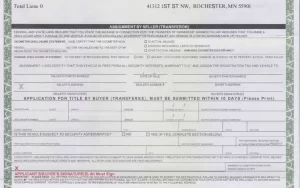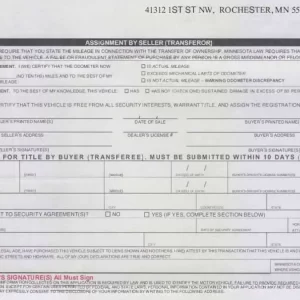Electronic title transfer
The Digital Road to Ownership: How Electronic Title Transfer is Reshaping Asset Exchange

The rustle of physical paper, the anxious wait for mail, the labyrinthine paperwork – for generations, these have been the hallmarks of transferring ownership of valuable assets. From cars and boats to real estate and even complex financial instruments, the traditional title transfer process has often been a slow, cumbersome, and even error-prone affair. But a quiet revolution is underway, one that promises to streamline, secure, and accelerate how we prove ownership: electronic title transfer.
Electronic title transfer, often referred to as e-titling or digital title management, is the process of converting traditional paper-based titles and ownership records into secure digital formats. This digital transformation allows for the swift and verifiable transfer of ownership rights without the need for physical documents. While the concept might seem straightforward, its implications are far-reaching, impacting industries from automotive and maritime to finance and beyond.
Why the Shift to Digital? The Compelling Advantages:
The move towards electronic title transfer is driven by a clear set of benefits that address the inherent inefficiencies and vulnerabilities of paper-based systems:
- Speed and Efficiency: This is perhaps the most immediate and impactful benefit. Imagine buying a car and driving it away the same day, with all ownership transfer completed digitally in minutes, not days or weeks. E-titling eliminates the need for physical mail delivery, manual processing, and the potential for delays caused by human error or bureaucratic backlogs.
- Reduced Costs: Eliminating paper, printing, postage, and manual labor significantly cuts down on the administrative costs associated with title transfers. This can translate into savings for businesses, government agencies, and ultimately, consumers.
- Enhanced Security and Fraud Prevention: Physical documents are susceptible to loss, damage, counterfeiting, and tampering. Digital titles, when implemented with robust security measures like blockchain technology, cryptography, and secure digital identities, offer a higher level of integrity and traceability. This makes fraudulent transfers significantly more difficult.
- Improved Accessibility and Convenience: Ownership information can be accessed, updated, and transferred from virtually anywhere with an internet connection. This makes the process more convenient for buyers, sellers, and intermediaries alike.
- Environmental Friendliness: By reducing the reliance on paper, electronic title transfer contributes to a more sustainable and environmentally conscious approach to asset management.
- Data Accuracy and Consistency: Digital systems can enforce data validation rules, minimizing errors and ensuring greater consistency in ownership records. This reduces the risk of disputes and legal complications.
- Streamlined Auditing and Compliance: Digital records provide a clear and easily accessible audit trail, simplifying compliance with regulatory requirements and facilitating smoother inspections.
Industries Embracing the Digital Transformation:
While the concept of e-titling is broad, its adoption is particularly notable in several key sectors:
- Automotive: The automotive industry is at the forefront of implementing e-titling. Many states in the US, for example, have developed or are developing systems for electronic vehicle registration and title transfers. This allows dealerships to complete sales more efficiently and buyers to manage their vehicle ownership digitally.
- Maritime and Aviation: The ownership of ships and aircraft involves complex international regulations and significant financial transactions. Digital title management systems are crucial for simplifying these processes, ensuring compliance, and enhancing global trade.
- Real Estate: While perhaps lagging slightly behind the automotive sector in widespread adoption, the real estate industry is increasingly exploring and implementing electronic recording of deeds and mortgages. This promises to revolutionize property transactions, making them faster, more transparent, and less prone to errors.
- Financial Services: Ownership of financial instruments, from stocks and bonds to digital assets, is increasingly being managed electronically. Blockchain technology, in particular, is proving to be a powerful enabler for secure and transparent ownership transfer in this space.
- Intellectual Property: The transfer of ownership for patents, copyrights, and trademarks can also benefit from electronic systems, providing a more efficient and documented way to manage these valuable intangible assets.
Challenges and the Road Ahead:
Despite the clear advantages, the widespread adoption of electronic title transfer isn’t without its hurdles:
- Regulatory Frameworks: Existing laws and regulations often lag behind technological advancements. Developing clear and comprehensive legal frameworks that recognize and govern digital titles is crucial.
- Interoperability: Ensuring that different digital title systems can communicate and exchange information seamlessly is vital for broad adoption, especially in cross-border transactions.
- Cybersecurity: While digital titles can be more secure than paper, they are not immune to cyber threats. Robust cybersecurity measures and ongoing vigilance are paramount to protect these valuable digital assets.
- Digital Divide: Ensuring equitable access to the technology and digital literacy required to participate in e-titling systems is important to avoid excluding certain segments of the population.
- Resistance to Change: Any significant technological shift can face resistance from established practices and stakeholders who are comfortable with traditional methods.
The Future is Digital:
The trajectory is clear: electronic title transfer is not just a trend; it’s the future of ownership verification and transfer. As technology continues to evolve, particularly with the growing influence of distributed ledger technology (blockchain), we can expect even more secure, efficient, and user-friendly digital title management systems. This transformation will not only simplify complex transactions but also unlock new possibilities for asset ownership, liquidity, and economic growth. The era of rustling paper is slowly giving way to the seamless, secure, and instantaneous world of digital ownership.
Showing the single result



